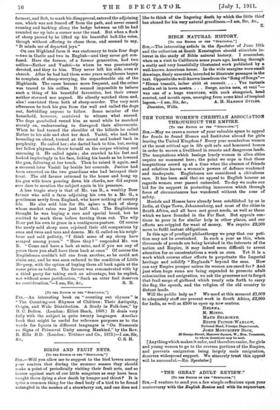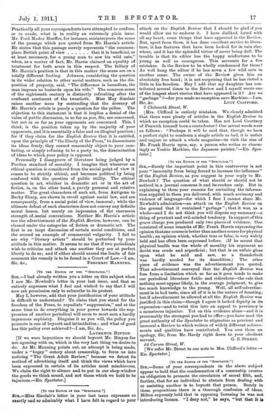"THE GREAT ADULT REVIEW."
[TO MI EDITOR OF IRE "SPECTATOR,"]
Snt,—/ venture to send you a few simple reflexions upon your controversy with the English Bewley and with its supporters.
Practically all your correspondents have attempted to confuse, or to evade, what is in reality an extremely plain issue. Mr. Ford Madox Hueffer, for instance, misinterprets the sense of the passage which you quoted from Mr. Harris's article. He states that this passage merely represents "the common-
place British point of view that it is beneficial, or at least necessary, for a young man to sow his wild oats," when, as a matter of fact, Mr. Harris claimed an equality of treatment for both sexes in this respect. The fallacy of Mr. Harris's position is that in this matter the sexes are on a totally different footing. Johnson, considering the question in its wider relation to other social matters, such as the dis- position of property, said, " The difference is boundless, the man imposes no bastards upon his wife." The common-sense of the eighteenth century is distinctly refreshing after the confused sentiment of the twentieth. Miss May Sinclair raises another issue by contending that the decency of Mr. Harris's article is purely a question for the police. The objection to this Statement is that it implies a denial of the value of public discussion, in so far as you, Sir, are concerned, but not in so far as your opponents are concerned. This, I think, is the position taken up by the majority of your opponents, and it is essentially a false and an illogical position ; for if they claim for the English Review that it is entitled, upon the principle of " the liberty of the Press," to disseminate its ideas freely, they cannot reasonably object to your com- bating, or simply refusing to be a party to, the dissemination of ideas to which your policy is opposed.
Personally I disapprove of literature being judged by a Puritan standard of morality. I imagine that whenever an ethical question is considered from the social point of view it ceases to be strictly ethical, and becomes political by being confused with the question of public utility. The ethical question in art, whether in dramatic art or in the art of fiction, is, on the other hand, a purely personal and relative matter. The great characters of such art, from Antigone to Becky Sharp, are shown in revolt against social law, and are consequently, from a social point of view, immoral ; while the ultimate defeat of such characters does not convey any definite moral lesson, but merely an impression of the enormous strength of.social conventions; Neither Mr. Harris's article nor the advertisement of the English Review, however, can be classed under the categories of fiction or dramatic art. The first is an inept discussion of certain social conditions, and the second an example of commercial vulgarity. I fail to see why " literary artists " should be perturbed by your attitude in this matter. It seems to me that if two periodicals wish to criticize and attack one another they are at perfect liberty to do so; and if either should exceed the limits of fair comment the remedy is to be found in a Court of Law.—I am,















































 Previous page
Previous page